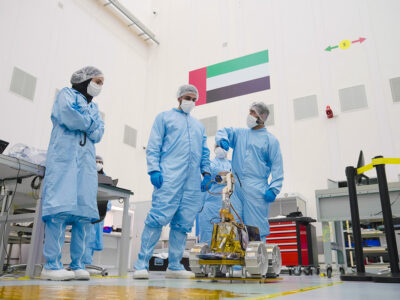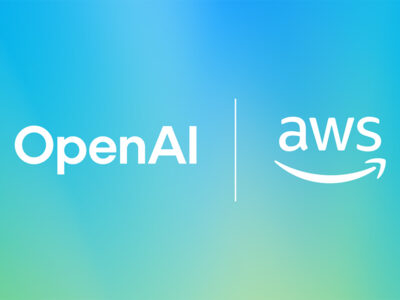Why AI is the modern workplace’s indispensable partner in employee empowerment
By Necip Ozyucel, Director of Cloud and Enterprise Business Group, Microsoft Gulf
We humans have an inherent tendency to pine for the past. In assuming that “things were better when…”, we often miss the strides made by mankind in almost every aspect of our existence. A decade ago, the smartphone revolution was in its infancy; the efficacy of cloud computing was a whispered dream; and artificial intelligence was a risible gimmick, only practical for the largest companies with the biggest budgets.
Today, many of our workplaces are awash with digital transformation. Millennials and their Generation-Z successors live their lives on their smartphones. The intelligent cloud sits at the centre of IT infrastructures in companies great and small, made intelligent by the same AI that was out of reach before. Hundreds of thousands of firms across the Arab Gulf region now realise digital transformation is not optional.
The power to engage customers is critical in increasingly competitive marketplaces. The chance to optimise operations must be seized, in an effort to control and reduce costs. And the reinvention of business models could mean the difference between leading and leaving the market.
Hey, what about jobs?
Despite these leaps, there are some who still wistfully dream of the past. We are, after all, navigating the Fourth Industrial revolution. And industrial revolutions destroy jobs, right? Yes, but history tells us they create more jobs than they destroy. Indeed, one of the pillars of digital transformation is the empowerment of employees. And automation is a partner in this process.
In the modern workplace, employees are empowered. Smart apps read emails on their behalf and even answer some of them. They are informed by their smartphones of their schedule for the day and how best to commute to avoid traffic. Advanced analytics tools help them understand wasteful bottlenecks in their daily activities and enable them to perform better. They are turbo-charged to make smarter decisions, boost productivity, develop new ideas, enhance customer services and delivery, and improve the overall business – all in the absence of demoralising micromanagement.
Bot why?
Even chatbots, seen as the quintessential example of job-threatening AI, can empower the workforce as never before. Apart from eliminating the burdens of repetitive tasks, their benefits include consistency in customer experience and information received; the ability to adopt new messaging platforms quickly and cost-effectively; and flexibility in marketing options.
They can support and scale business teams in their ability to serve customers, slash costs and increase customer satisfaction. They can be embedded in enterprise mobile apps and websites, giving the demanding customers of today – increasingly millennial, or younger – the flexibility for which they are looking. This means a growing customer base, greater customer loyalty and – paradoxically, for those who assume they kill jobs – the need for more staff.
Cases in point
In early 2017, Dubai Electricity and Water Authority (DEWA) launched an online chatbot called Rammas. Capable of communicating with customers in both Arabic and English, Rammas quickly assumed the role of the utility’s first-line contact point. DEWA was able to drastically cut footfall at all its offices by encouraging the use of digital channels, in support of the Smart Dubai initiative.
Built on the natural-language processing capabilities within Microsoft’s Cognitive Services platform, Rammas is a virtual employee, albeit one that never sleeps or takes breaks, and one that can handle almost limitless numbers of customers at a time. This means it can provide 24-7 instant service. It handled more than 87,000 enquiries in its first six weeks of operation, and garnered glowing feedback from customers. Meanwhile, Rammas’ human colleagues were freed from dealing with more standard, monolithic queries. They could dedicate significantly more time to customers with complex issues.
Microsoft is currently working with Islamic finance pioneer Kuwait Finance House (KFH) to develop a similar artificial-intelligence chatbot – a first for the country’s banking sector – built on the same Microsoft technologies as Rammas. Tailored specifically to the needs of the finance sector, the KFH bot will be integrated with Microsoft’s advanced analytics platforms to more efficiently analyse customer enquiries, and facilitate wider and deeper data insights for employees.
Achieve more
Digital transformation is not any threat to employees; their empowerment is a pivotal link in the chain. Greater productivity, more challenging roles and enhanced opportunities for innovation all lie within the employee’s grasp in the modern workplace. Microsoft’s vision is of an entire planet of individuals and organisations achieving more – where instead of saying “it was better when…”, we say “remember when we had to…”.
Customer engagement has never been easier, now with AI
By Stasa Podgorsek, Data and Artificial Intelligence Business Lead, Microsoft Middle East and Africa
Competing for customers used to be a lot simpler. Diligent market research would expose a gap in the market, a company would tailor a product or service to match, and presto – an almost instant and sustainable customer base. But times have changed. Today’s customer is plugged in to almost limitless reservoirs of knowledge: about you and your products; about your competitors and their products.
It is high time you got to know your customers as well as they know you. Digital transformation can help with this. AI tools plug you and your business into your own information reservoir. That reservoir, and the AI tools that serve it, allow you to anticipate customer needs. It allows marketers to create highly personalised campaigns, helps sales teams to quickly identify customer-purchasing patterns, empowers customer-service reps with actionable information, and digs out the characteristics and preferences of high-value past customers.
Making the future
Let’s start with manufacturing. GCC-based manufacturing companies face an onslaught of challenges. As part of Dubai Plan 2021, for example, the emirate’s government initiated Industrial Strategy 2030, putting pressure on manufacturing firms to turn Dubai into an innovation hub. The industrial sector is now Dubai’s third largest, and the government forecasts around US$190 million to be spent on R&D by manufacturing companies as the sector expands to a value of nearly US$16 billion by 2030, creating more than 27,000 specialised jobs. In other words, innovation is expected. Businesses that do not rise to this challenge will be left by the wayside.
Digital transformation, through AI, allows manufacturers to engage customers in ways that were previously unthinkable. Microsoft technologies allow delivery of the “smart factory” concept. ERP and CRM merge into one unified solution; the Connected Field Service enables IoT solutions to connect right through to the back office; and a plethora of analytics options offer platforms for innovation.
Customers are already noticing. The agility of digitally transformed companies allows them to alert customers to delivery delays or suboptimal performance in installed products. Those businesses can build elaborate, visual customer-engagement histories, allowing the elevation of service levels. They can deliver predictive maintenance, where IoT sensors alert manufacturers to problems with a product on a customer site. By despatching a field technician to fix the issue prior to breakdown, not only does the cost of support fall for the manufacturer, but the customer sees less downtime. This engenders brand loyalty.
Shopping around
Today’s customers are more demanding than ever before, especially in consumer markets. Millennials and the emergent Generation Z expect a digital experience, but they also require businesses to treat them as individuals – to be consistently aware of previous conversations and transactions, and to give relevant, timely information.
The retail sector is one of the Arab Gulf’s fastest growing industries. It is now in full recovery, according to data from Alpen Capital, projected to be worth US$ 313.2 billion by 2021. The UAE will take more than half (53%) of that market, followed by Saudi Arabia (14%) and Oman (12%). The report also predicted not only new e-tailers, but robust investment by existing players in digital transformation.
Engagement of customers for the GCC retailer means giving them the personalised experiences they expect. It means giving them choice, with omni-channel solutions that allow AI components to collect the data necessary to allow the intelligent cloud to do its work. Understanding customers is paramount in the battle to impress them more than your competitors do. Analytics platforms such as those coupled with Microsoft solutions allow a 360-degree view of the customer. They enable social listening, one of the most potent brand-building tools available today – the ability to monitor social media sites for what your customers are saying about you, as well as also determine the next best action in an automated manner – to help organizations engage more effectively with their customers.
Customer engagement is not about technology, it is about knowing your customer. But technology certainly gives businesses the tools to get to know their customers, and AI sifts out and routes that information in a timely and relevant fashion, enabling your brand to stand out and thrive.
AI can build bridges to digital futures, through optimisation and product transformation
By Necip Ozyucel, Director of Cloud and Enterprise Business Group, Microsoft gulf
When some people think of digital transformation and artificial intelligence, they think primarily of systems and data working together to promote business intelligence and automate tasks. It is natural to see how this translates into better market knowledge, and so engaging customers and empowering employees is easy to visualise. Indeed, digital transformation and AI can deliver on these promises. But they can do so much more. They can reinvigorate the business itself. They can optimise operations and even change the way a company does business, through the transformation of products and services.
The Internet of Things, for example, along with supporting AI-based platforms can form a digital nervous system of sorts, for governments that are pursuing smart-society models. According to AT Kearney, IoT could deliver as much as an 11% increment to GCC-wide GDP over the next decade. And private-sector revenues from IoT could reach $11 billion by 2025. According to the International Data Corporation (IDC), MEA healthcare providers spent more than $500 million on IoT solutions in 2016, with analysts noting that IoT-based healthcare services in the region were “maturing rapidly toward mainstream deployment”.
Regional trendsetters
The GCC has earned a reputation for ambition and nerve in the technology industry. It is home to many early adopters. This is showcased each year at Dubai’s world-famous GITEX Technology Week. The event’s host, the Dubai World Trade Centre, led by example recently, embarking upon its own IoT project. It improved asset management for more than 7,000 pieces of audio, video, and lighting equipment. Implementing a Microsoft cloud solution that uses IoT to connect sensors, ibeacon tags, and a back-end ERP system, DWTC gained real-time insights into the location and usage of assets, and optimised a range of functions, from equipment allocation to inventory management.
In the GCC oil and gas sector, artificial intelligence sits at the heart of solutions that include technologies like IoT, machine learning and big data analytics. These solutions are vital in increasing productivity and streamlining processes, while ensuring companies remain secure and compliant.
Oil and gas companies worldwide have adopted AI solutions to drive digital transformation. Halliburton used a hybrid global cloud platform to enhance its value chain, through Microsoft’s AI tools, augmented reality, and Industrial IoT technologies. And Schneider Electric used edge analytics to enhance remote asset-management through Microsoft machine learning and edge computing.
Optimisation benefits
Exploration, drilling, production, transportation, storage and trading are all enhanced by the intelligent cloud and the intelligent edge. Optimisation, efficiency and profitability now come as standard in an industry that is thirsty for innovation. Advanced analytics makes actionable sense of the vast data lakes created by IoT sensors. Through deep-dive analysis of these lakes, exploration, drilling and a host of other areas can be optimised, including security and workplace safety.
Even the health of machines themselves is not off-limits to machine-learning platforms like those found the trusted Microsoft cloud. These platforms can raise alarms ahead of time about the potential breakdown of machinery, by analysing historic data. In the manufacturing industry, such predictive maintenance not only represents an optimisation of internal resource allocation and reductions in downtime. It can be offered to customers as a value-added service. Indeed, AI and its partner, IoT, have led to the emergence of a new business model in the manufacturing industry. Its name is servitisation.
Building better business models
Industrial revolutions tear down old paradigms to make way for new ones. We are now on our fourth, and servitisation has emanated from that paradigm shift. The AI, cloud storage and the connection of devices are all now a lot more affordable. By creating connected products as part of an IoT ecosystem, manufacturers can gather and store data more cheaply, and act on it more effectively.
Meanwhile, manufacturers’ customers are also trying to do more with less, and prefer to purchase capabilities rather than assets, thereby reducing TCO. In the servitisation model, IoT-based solutions create a perennial symbiosis between manufacturers and customers. Automatic, remote, guided support options become the norm. Not only does this model allow predictive maintenance, and its associated cost reductions and customer goodwill. It also directly increases revenue, by creating more options for margin on each product sold.
Moving forward
AI can build a bridge to the future, optimising and reinventing the machinery of business itself. This is going on all around us, and every business, regardless of scale or industry, can share in the promise of a future built in the digital world with benefits accruing to real people and organisations, all of whom will achieve more.
Brand View allows our business partners to share content with Arabian Business readers.The content is supplied by Arabian Business Brand View Partners.








